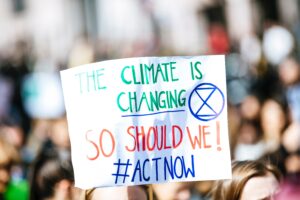Audronė Telešienė, Professor of sociology at the KTU Faculty of Social Sciences, Arts and Humanities, has been invited by the United Nations Environmental Programme (UNEP) to join almost 100 scientists from around the world tasked to draw up a Global Environmental Outlook by 2026.
The Global Environment Outlook (GEO) is often referred to as UNEP’s flagship environmental assessment. The first publication in 1997 was originally requested by Member States. In 2026, the 7th edition of the GEO will be published. According to the recent GEOs, we are facing a triple planetary crisis: climate change, biodiversity loss and pollution.
Although global environmental problems are being addressed by international political agreements, such as the Paris Agreement on climate change, the Aichi Biodiversity Targets, and the Nagoya Protocol on access to genetic resources. However, according to Audronė Telešienė, a sociology professor at the Kaunas University of Technology, Faculty of Social Sciences, Arts and Humanities, current policy agreements are not yet in effect, while the global environmental condition is getting worse.
According to her GEO-7 will be dedicated to finding solutions and answering the question of how the planet’s evolving crises can be handled by 2050.
Telešienė is the only Lithuanian scientist invited to the board of experts.
Climate change is no longer “topical”, it is a crisis
Long gone are the days when environmental problems were “topical” – when they were dealt with by dedicated ministries and expert groups. Today, at least three (according to certain scientists, four) of these problems have grown into crises.
A crisis is a breaking point from which changes with little control and predictability, potentially with major negative impacts on ecosystems and humanity itself start. This means that we are already living in a climate crisis – a critical threshold of biodiversity loss, a crisis of pollution and a crisis of land/soil degradation.
Even if these alarming signs are not visible in Lithuania, it does not mean that the devastation is not raging elsewhere on the planet. Countries on the African continent alone are losing billions of US dollars a year from the effects of climate change.
Small-island countries such as Kiribati and Tuvalu are already planning where to relocate their populations, as rising ocean levels will cause the islands to be completely submerged within a few decades.
In Lithuania, too, the negative impacts are being felt – especially in coastal territories of the Baltic Sea or in densely populated urban city areas.
Do Lithuanians understand the issue?
According to a survey, the major area of concern for Lithuanians is social-economic problems[1]. In November 2022, one-third of the Lithuanian population said that healthcare issues are the most important, and a quarter of the population thought that economic problems were the most important for Lithuania. Poverty and education issues were also ranked highly.
Only 4 per cent of Lithuanians think that environmental protection is the most important issue.
“While the environmental problems at a national level are being viewed as moderately important by the Lithuanian population, at a global level, they are perceived as far more important. Climate change, according to Lithuanian citizens is the number one global issue. This shows a high level of awareness about global environmental problems,” says the KTU professor.
Two possible scenarios for change
It is already being discussed that the GEO-7 will model two scenarios of possible changes. The first one is linked to technological transformation. Such transformation would primarily take place through innovation and the widespread adoption of existing technologies.
The second scenario relates to behavioural transformations. Such transformations would take place through changes in the attitudes, habits, and behavioural patterns of the population, and are believed to create powerful catalysts for transformation in industry, politics, and other sectors.
“There are many areas of human activity that contribute significantly to environmental problems. There is a scientific consensus that change would be most effective if we acted on a few priority systems such as food, energy, and waste management. Transformations in waste and material management are linked to the circular economy,” explains the professor.
By transforming these three systems, together with the economic and financial system, says Telešienė, we could achieve a stable climate, high natural biodiversity and a near-zero-waste, circular economy by 2050, all of which would deliver prosperity in all geographic regions of the world.




